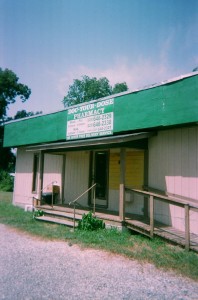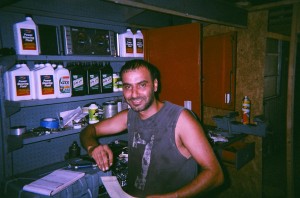Day 12: Limping Homeward
categories: Cocktail Hour
8 comments
![Into_the_Gulf048[1]](http://billanddavescocktailhour.com/wp-content/uploads/2010/08/Into_the_Gulf04813-300x270.jpg) I meant to get to Texas, I really did. And I would have made it were it not for the little blinking red light on the dashboard winking up at me like a creepy one-eyed man. Not only would I have made it but I might have kept going and going and right now the Rav IV might be floating in the Sea of Cortez. As it was I was so enjoying driving through the Louisiana lowlands of shaggy trees and egrets and herons that I ignored the light as best I could, putting my faith in Ali, the smiley chain-smoking mechanic who had replaced the coil on the cheap the day before in the Araby section of Challmete But the anxiety I was already feeling ,which had been free-floating, now became less so, clumping into a knot in my chest that wouldn’t go away no matter how I squeezed my blue EPA stress ball.
I meant to get to Texas, I really did. And I would have made it were it not for the little blinking red light on the dashboard winking up at me like a creepy one-eyed man. Not only would I have made it but I might have kept going and going and right now the Rav IV might be floating in the Sea of Cortez. As it was I was so enjoying driving through the Louisiana lowlands of shaggy trees and egrets and herons that I ignored the light as best I could, putting my faith in Ali, the smiley chain-smoking mechanic who had replaced the coil on the cheap the day before in the Araby section of Challmete But the anxiety I was already feeling ,which had been free-floating, now became less so, clumping into a knot in my chest that wouldn’t go away no matter how I squeezed my blue EPA stress ball.
And so I finally let good sense, a rare visitor to my mind over the last few weeks in the Gulf, get the better of me and I turned around and headed home. Galveston had been my goal but now the town of Grossetete, Louisiana became my end and westernmost point. I will remember Grossetete for the ramshackle little building called the “Doc-Your Dose Pharmacy” and the older white woman I chatted with by the river who assured me that the destruction of the mostly African American lower 9th Ward had been “God’s will.” The day had begun with grand intentions but I would now spend it driving what amounted to a 160 mile U-turn, heading back to New Orleans, where I’d started. 
Of course I won’t let the fact that I didn’t reach Galveston stop me from telling you about the city. It is the city that drowned first, a century before New Orleans. The story of that drowning, and the recent re-drowning during Hurricane Ike, is as simple and powerful as a fairy tale, though a grim old fashioned fairy tale of the sort New Orleaneans might read to scare their children. It is the story of a people who believed in straight lines, a story of a people who built high walls, thinking they could stop the sea, and how those walls ultimately doomed the city, and it is a story that has great resonance today as we try to force our will on events beyond our control. In the summer of 1900 Galveston, which was then a thriving port town, was struck by a storm that remains the deadliest hurricane in United States history, killing twenty percent of the city’s people and destroying all of its buildings. The town responded by vowing “never again” and constructing a massive sea wall. But the wall ultimately acted, as geologists like Orrin Pilkey and others predicted, by destroying Galveston’s beaches, its natural buffer and protection, leaving it defenseless and setting up this decade’s disaster when Ike struck and destroyed the city again.
* * *
This trip began with my swimming at Tarball beach. It ends with President Obama swimming at Panama beach, telling us all is okay. This is a lie of course. (Here is a link to my letter to Obama that OnEarth magazine just published.) Dig a foot down at any of these barrier beaches and you will still find the hidden tarballs. Where’s the oil? Right there, and plenty of other places.
Last night, before my aborted trip to Galveston, I toured the city of New Orleans with Kevin McCaffrey, a filmmaker who showed me neighborhoods that had been underwater and walls that hadn’t worked (and likely wouldn’t work again). We wound up eating good greasy food (I had a great chicken fried steak) at a place called Frankie and Johnnie’s. I taped many of the profound things Kevin said about Katrina and the oil but right now I am too tired to get those words off the tape (my apologies, Kevin), though they will eventually make it into the book I will write about this trip. What I do remember was talking about football and football, it occurs to me now as the trip ends, has been a kind of leitmotif of this journey. One thing this trip has done is dislodge my regional prejudice that the Patriots victory in January after 9-11 was the most emotional win in Super Bowl history. I now concede that last year’s victory by the Saints meant more, since as you tour this beautiful, doomed city, you begin to understand just how much it meant to the people here.
It makes sense that Kevin and I talked some football since the way we knew each other was through Kate and Steve Sidwell. For several summers my wife, daughter and I house-sat for the Sidwells in Brewster on Cape Cod. Kate is an artist, extravagant and generous, who loves New Orleans and came back here to help re-build the city after Katrina (and found a terrific dog named Buddy). Steve is a former pro football coach—once a defensive coordinator for the Patriots, Seahawks, and Saints–with a big heart and great charm, the capacity to eat great amounts of food, and the growling resonant voice of a talking cartoon bear. While the Sidwells spent the month touring the world we would watch their art-filled house, feed their cats, mow their lawn, soak in their hot tub. Anyway, Frankie and Johnny’s was a place that Kevin used to visit with the Sidwells and so we talked football and art and I thought “Thank God the Saints won, but that isn’t going to stop this place from flooding again.”
But that was last night and now it was time to truly head home. In fact, I almost managed to do that and drive right past New Orleans until something made me tug and wheel to the right and, before I knew it, I was driving back down into the French Quarter in search of French 75 and one last Daisy for the road. To counteract or complement (depending on your take) the drink, I also requested a road cigar, and Cindy (who seemed every bit as professional and a whole lot nicer than the famous bald-headed Chris) promised me that the cigar she handed me
would be a “long burn,” as it indeed proved to be since I smoked it, on and off, most of the way home.
I drove up and across Mississippi, sleeping in Meridian, home of the great Brad Watson (whose wonderful book, Aliens in the Prime of Life, came out this past spring.) It would be vainglorious and egomaniacal to compare myself to Ulysses heading home and it’s true I did not have to slay any suitors when I finally limped back to my Ithaca (Wilmington.) But I did have a brand new house on a salt marsh to move into, the first that my wife Nina and I have ever owned, and I did experience an unfamiliar feeling settling over me, that of settling and settledness.
But I’m not a settler at heart and these are not settled times. We are coming into hurricane season and our home is one of the season’s bull’s eyes. I don’t need to tell you where one of the other ones is and how winds might whip up the oil. I find my thoughts already boomeranging back to the Gulf as I picture the billions of migrating birds that are already streaming down toward the degraded marshes and waters. When we walked deep into the marsh in Alabama, Bill Finch suggested I come back in the fall to witness the migration of the white pelicans. That, it seems to me, is a hard offer to refuse. I suspect that mine, like most of ours during these tattered times, will be a most unsettled settling.



![001[1]](http://billanddavescocktailhour.com/wp-content/uploads/2010/08/0011-300x225.jpg)

WALSTRIB,Dave;from Tar Balls to Tar Babies.Reading Benediction,On Apprenticeship and A Letter To An Apprentice before wandering back here I look hard at the face of Ali and see there myself as a younger man;moving from apprentice to journeyman.Like a dishwasher moving from the Hobart machine to the food prep line with visions of being a Chef I look back on other crafts/arts/vocations.I have ever been willing to “take six months off and become a brain surgeon”;in my stolen and adulterated version of the story the surgeon manages to laugh embarrassingly loud and invite the writer to scrub up and begin on Monday morning.That outcome fits the bizarre reality of my “stretched”history wherein humans walk straight through the walls that seem so solid in the mind but evaporate when eyes meet.The simple arc of infatuation,worship and disillusionment is but one curving ringlet of the Medusa;a coil of the snake that may be the beginning of a hilarious Hognose charade or a life changing Cottonmouth’s quiet warning.
It is a truth that we are not aware in the beginning of the scope of the task of transformation,as that sinks in the fetid depths of self loathing are roiled and in the moment that we speak of the speck in our mentor’s eye it becomes certain he will touch the log we are so unaware of and send us reeling- perhaps never to return.
I am the jack of trades,a dilettante who’s acquired calluses from failure and returned to this curious trade/art to pick the scab of an old wound and wonder with Leonard Cohen’s words”was I only limping,was I really lame?”
I came out of high school to a Southern psudo-ivy school.Unable to type,or spell;rebellious ever towards the rules of the road of grammar I had under my belt a community college English composition class and the heady experience of drawing laughter and tears from my classmates with written words.Bypassing the skills class I needed so badly I sailed straight in to Chaucer.”When with April showers soote then ylongen folke to be gone a pilgrimages”;the pilgrimage I took there was full of bawdy fun and pratfalls but the reality of my lack of skills let me fall so hard I found myself walking into a repair shop that had a “help wanted”sign in the window.Like the state of Rapture that hits a caver in a critical maneuver my writing self was suspended in time and watched as my life changed.
The tar baby of technology has saved me from the inability to spell,the typing I acquired unaware while studying auto repair over the internet in a network of technicians;writing there in the forums which were open to subjects I felt passionate about the old paralysis of Rapture fell away and I can move again in this world of words.Like the caves I wandered long ago I find the this world full of quiet pleasures.Pools where stone islands float- because no one has disturbed the surface for a hundred years as the water evaporated and left it’s limestone load behind-the words of Thoreau and Bartram. Branching Helagmites and Helagtites showing the slow shifts of the earth are the pieces built on earlier tomes.Like in the caves I must make enough marks to find my way back,or lead a rescuer to the place I may have fallen ,but I try to do no damage;maximize the documentation and minimize the destruction.White nose syndrome and the effect of CO2 on the Lascaux paintings are real,hope I’m not hurting anything here.
I will disagree that all disasters are foreseeable in any endeavor but basically do “stand by my man” with his finger on the buttons of the tar baby.Hope he,you and Bill have a lovely day today as well as a honey who knows what to do,and does you right.
Peter,
Sorry to be so slow in responding but I’ve been back on the road. I like the way you take apprenticeship beyond the literary. And don’t let spelling stop you–I would be nowhere without spell check (and I aint got it here.) Thanks again for being so much a part of the community durign the Gulf trip. And sorry you had to meet Tommy.
Best, DG
Oh, Tommy, the joke sign was up. I love you,too.
Et tu, Davidus?
(A Cocktail Hour Sonnet)
In Europe, not so much as a gas station goes forward
without a gov’t response to foreseeable disaster being
properly in place, and all oil disasters are foreseeable.
It was that way here till Reagan got his hands on regulation,
and then Clinton (with Republican Congress) kept strangling,
and then came Cheney, in for the kill. As for the tools
for disaster response? All gone, defunded, or owned
by the companies Cheney shilled for, private enterprise, my ass.
What was Barack to do? Send in aircraft carriers? We
serve the devil attacking him instead of the people (sic)
who put us (and him) in this position by devastating
government and not just ecosystems. And we weaken
our man, yes ours, when it comes time for his re-election
Or do you trust that President Palin will bring correction?
What is he to do?
A few thoughts. Funnel the early anger and energy over the spill to begin to reverse the changes you are talking about. That’s how things get done–you have a crisis and therefore you have a moment and you use the moment and the rules change. Specifically do NOT hand the whole thing over to the compnay that made the mess. Rather hold them accountable (the way it worked was that BP was the one holding others accountable.) Really accountable–not just some fake tough words. Use the situation to highlight warming and energy issues rather than going for the big thumbs up/it’s all ok approach.
Of course I still support him over all. But on an issue that I now know a little about first hand he has been very very weak.
So, we agree. And need to offer praise where it’s due as well–Our man pushed past the $75,000,000 damages cap put in place after Valdez to get 20 billion out of BP, still a scant amount, granted. He’s changing the rules on deep-water and even other drilling despite fierce and well-funded opposition. He’s got the justice dept looking into criminal charges. He’s working to restore regulation in dozens of pertinent areas. And a lot more, all under-reported and underplayed in an effort to shift blame from the greedy and very powerful creeps who set us up for this disaster (which you rightly point out is ongoing and will stay with us long), greedy creeps whom the previous administration put in charge of all oversight and all regulation and all disaster response and all equipment acquisition, and who used their power to dismantle all of the above, and who can’t be rooted out in eighteen months, and not in four years, either–I’m just saying let’s be careful whom we undermine, and whom we find ourselves allied with in the rush to demonize the wrong man: the very people so adept at funneling anger away from themselves and to where it does them the most good.
David always enjoy reading your work, you have a true gift for capturing the Feel of what you are writing about . Kate and I are proud to say we steered you toward Frankie and Johnie’s the essential joint in New Orleans, many a great conversation has occured in the great history of such a perplexing place. We miss your trips to Cape Cod but seemsall very good where you are. We plan to spend Jan and Feb in the city New Orleans downtown withBuddy and you and Nina would be so welcome, We plan to drive down ourselves withBuddy, We will bring the animals but the house here is availiable if you and Nina wantto take a little winter Cape break, Your table is still here and we are saving it for American History museum when you write your books toward the end of your life.Ha. really we are saving it for posterity, it is such a beautiful thing. Steve and Kate
check out Arthur Rogers Gallery on Julia Street and see some of the Katrina art
amazing work, by David Bates and one by Jacqueline Bishop will take your soul to its core
welcome back, David! I agree that the Saints winning was probably the most emotional win in Super Bowl history, but second only to when the Steelers won in 2005. Remember?! It was jerome bettis’s last year?!
anyway, can’t wait to read the book version.